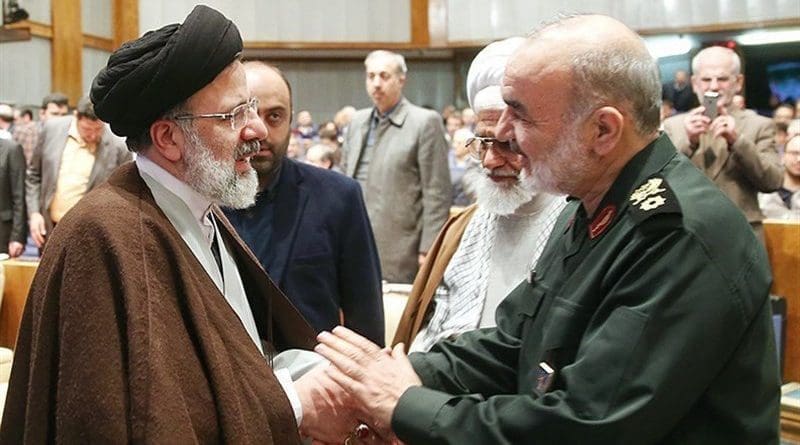Return Of A Hard-Line Iran Raises Worrying Questions – OpEd
By Arab News
By Ishtiaq Ahmad*
With the assumption of the Iranian presidency by a hard-line leader whose political interests seem to align with the dogmatic vision of Supreme Leader Ali Khamenei, Iran is likely to become more aggressive in its external behavior.
In his inaugural speech last week, President Ebrahim Raisi expressed his desire to have better relations with Iran’s Arab neighbors, while also pronouncing Iranian militarism across the Arab world as a source of “stability and peace in various nations.”
This paradox has marked the Iranian approach toward its Arab neighbors since 1979, with Tehran aggressively seeking regional hegemony by exporting sectarianism while also keeping the pretense of brotherhood alive.
Hence, the time ahead for the Gulf countries is fraught with potential risks. There are two major security concerns with Iran: Its support for militant proxies that cause instability across the Arab world, and its use of precision-guided missiles and drones against critical infrastructure in Saudi territory and maritime traffic in the Arabian Gulf.
These concerns underscore a major security dilemma that is at the heart of two parallel negotiating processes underway since April 2021: The P5+1 (UN Security Council permanent members and Germany) talks with Iran to revive the Joint Comprehensive Plan of Action (JCPOA), whose sixth round ended in June without an agreement; and the informal talks between Saudi and Iranian interlocutors, facilitated by Baghdad.
The fate of both dialogues now hangs in balance. For the new Iranian leader, “regional and missile issues are non-negotiable.” Saudi Arabia and its Gulf allies want these issues to be incorporated in the revised JCPOA. The 2015 nuclear accord failed to do so, thereby enabling Iran to expand its militant network across the Arab world, and develop precision strike capabilities using drones and guided ballistic missiles.
Consequently, Iran has stirred up regional conflict and instability through the Quds Force, militias in Iraq and in Syria, the Houthis in Yemen, Hezbollah in Lebanon and Hamas in Palestine. Iran has also put into practice its precision strike capabilities by orchestrating, directly or through the Houthis in Yemen and militias in Iraq, major attacks against critical infrastructure in Saudi Arabia. Iran also continues to target maritime traffic in the Arabian Gulf with greater vigor and has geared up the nuclear enrichment process in violation of the JCPOA.
A major reason Iran has been able to get away with its militarism and nuclear jingoism is the consistent erosion of the US military commitment in the region — a process that has accelerated under the Biden administration. In fact, by removing the Houthis from the US designated list of terrorist organizations, Washington has implicitly endorsed Iran’s deadly activities in the region.
But the return of the hard-line leadership in Iran has pushed Tehran into a cul-de-sac: Biden now has to deal with an elected president facing US human rights sanctions for his role as a judge in the tribunal that awarded death sentences to thousands of Iranian citizens in 1988. Frustrated with the Iranian demands that cannot be met, US Secretary of State Antony Blinken has already said the talks to renew the JCPOA “can’t go on forever.”
The US special envoy for Yemen, Tim Lenderking, has also lately discovered that the real culprits in the Yemen war are the Iranian-backed Houthis. Hence, the recent talk of the US Treasury imposing sanctions on Houthi leaders and Iran’s precision strike capabilities.
With the hard-liners returning to power in Iran, the US and its allies in the region will have to work out a joint military and economic strategy to bring the Iranian leadership to its knees.
Conditions are ripe for this purpose. Iran is already crippled economically under the impact of US sanctions. The Abraham Accords have strategically aligned the Gulf against Iran. And the post-pandemic economic recovery has enabled Saudi Arabia and its Gulf allies to resume economic diversification plans, even amid persisting security threats from Iran.
The proposed strategy could entail the expansion of international economic sanctions against Iran; the redesignation of the Houthis as a terrorist entity; and an unequivocal US guarantee to protect shipping lanes in the Gulf waters against Iranian drone and missile attacks. Depending on the outcome, more punitive measures may follow.
- Ishtiaq Ahmad is a former journalist, who has subsequently served as the Vice Chancellor of Sargodha University in Pakistan and the Quaid-e-Azam Fellow at the University of Oxford.

